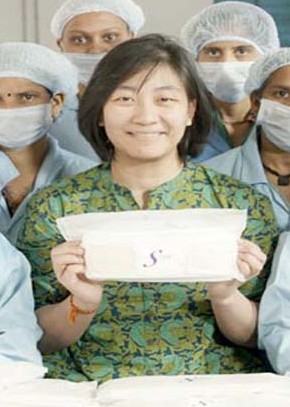 LONDON: Two Indian entrepreneurs, one behind an environmentally-friendly sweetener and the other who markets 100 per cent biodegradable sanitary napkins, have bagged USD 30,000 each as the finalists of the 2018 Cartier Women s Initiative Awards.
LONDON: Two Indian entrepreneurs, one behind an environmentally-friendly sweetener and the other who markets 100 per cent biodegradable sanitary napkins, have bagged USD 30,000 each as the finalists of the 2018 Cartier Women s Initiative Awards.
Swati Pandey of Arboreal Agro Innovations, which oversees the production of an innovative, high-yielding variety of Stevia sweetener, and Kristin Kagetsu of Saathi Inc, which uses banana fiber to create sanitary napkins, were announced as the Asia-Pacific finalists for the awards set up to honor and support female entrepreneurs.
This year s finalists were selected from around 2,800 applications from over 130 countries for the awards created in 2006 as a joint partnership project initiated by Cartier, McKinsey & Company and INSEAD business school.
“With a growth in both the quantity and the quality of the businesses applying, the initiative has become a transformative step in the lives of women entrepreneurs,” said Cyrille Vigneron, CEO of Cartier the French luxury goods conglomerate.
Delhi-based Swati’s business was selected for its triple focus on achieving economic, social and environmental value.
Inspired by her mother who suffers from diabetes, the entrepreneur is confident that the use of Stevia instead of sugar can have a positive impact on the society and economy in India, as well as the ecosystem.
The natural sweetener uses less water and land but reportedly delivers the same level of sweetness as sugar.
The company employs local farmers who could see their income potentially double in five years due to Stevia s higher cash profitability per acre.
“Stevia is the next generation, zero calorie, 100 per cent natural sweetener,” Pandey claims.
For Ahmedabad-based Kagetsu, her discovery was born out of being confronted with the environmental challenges India was facing as conventional sanitary pads commonly used in the country contain toxic chemical agents and, on average, 3.4 grams of plastic each.
They make up 150,000 tons of waste, which is generally disposed of by burning, with each sanitary pad releasing 23.4 grams of carbon dioxide in the process.
 Saathi Inc’s 100 per cent biodegradable sanitary pads are made of banana fiber, a natural by-product of banana farming, which is converted into a soft absorbing pad via a patent-pending fiber-processing technology.
Saathi Inc’s 100 per cent biodegradable sanitary pads are made of banana fiber, a natural by-product of banana farming, which is converted into a soft absorbing pad via a patent-pending fiber-processing technology.
“For the consumer there is a health benefit because it is a completely chemical-free process and we are using all-natural materials,” said Kagetsu, who is also working on ensuring access to the product across rural India.
The Indian finalists will join 16 others from around the world in Singapore to participate in an awards week program, including business workshops and coaching sessions, in April.
The award-winner, to be unveiled on April 26, will receive USD 100,000 and one-to-one personalized business mentoring.-PTI







